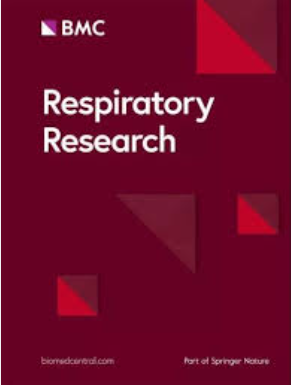Statins did not reduce the frequency of exacerbations in individuals with COPD and cardiovascular comorbidities in the COSYCONET cohort
IF 4.7
2区 医学
Q1 RESPIRATORY SYSTEM
引用次数: 0
Abstract
The evidence regarding effects of statins on exacerbation risk in COPD remains controversial. Previous studies often excluded patients with cardiovascular comorbidities despite their high prevalence in COPD and role for exacerbations. Based on the cardioprotective properties of statins, we hypothesised that statins may reduce the risk of exacerbations especially in patients with cardiovascular comorbidities. One thousand eight hundred eighty seven patients of the German COPD cohort COSYCONET (COPD and Systemic Consequences Comorbidities Network) of GOLD grades 1–4 (37.8% female, mean age 64.78 ± 8.3) were examined at baseline and over a period of 4.5 years for the occurrence of at least one exacerbation or severe exacerbation per year in cross-sectional and longitudinal analyses adjusted for age, gender, BMI, GOLD grade and pack-years. Due to their collinearity, various cardiovascular diseases were tested in separate analyses, whereby the potential effect of statins in the presence of a specific comorbidity was tested as interaction between statins and comorbidity. We also identified patients who never took statins, always took statins, or initiated statin intake during the follow-up. One thousand three hundred six patients never took statins, 31.6% were statin user, and 12.9% initiated statins during the follow-up. Most cardiovascular diseases were significantly (p < 0.05)may associated with an increased risk of COPD exacerbations, but in none of them the intake of statins was a significant attenuating factor, neither overall nor in modulating the increased risk linked to the specific comorbidities. The results of the cross-sectional and longitudinal analyses were consistent with each other, also those regarding at least 1 exacerbation or at least 1 severe exacerbation per year. These findings complement the existing literature and may suggest that even in patients with COPD, cardiovascular comorbidities and a statin therapy that targets these comorbidities, the effects of statins on exacerbation risk are either negligible or more subtle than a reduction in exacerbation frequency. Trial registration ClinicalTrials.gov, Identifier: NCT01245933. Other Study ID (BMBF grant): 01GI0881, registered 18 November 2010, study start 2010–11, primary completion 2013–12, study completion 2023–09. https://clinicaltrials.gov/study/NCT01245933?cond=COPD&term=COSYCONET&rank=3他汀类药物并未降低 COSYCONET 队列中患有慢性阻塞性肺病和心血管疾病的患者病情加重的频率
关于他汀类药物对慢性阻塞性肺疾病加重风险的影响,目前仍存在争议。尽管心血管合并症在慢性阻塞性肺病中的发病率很高,并对病情加重起着重要作用,但以往的研究往往将心血管合并症患者排除在外。基于他汀类药物对心脏的保护作用,我们假设他汀类药物可以降低病情恶化的风险,尤其是对合并心血管疾病的患者。我们对德国慢性阻塞性肺病队列 COSYCONET(慢性阻塞性肺病和全身并发症网络)中 1807 名 GOLD 分级为 1-4 的患者(37.8% 为女性,平均年龄为 64.78 ± 8.3)进行了基线和为期 4.5 年的横断面和纵向分析,以了解他们每年至少发生一次病情加重或严重加重的情况,并对年龄、性别、体重指数、GOLD 分级和包年进行了调整。由于他汀类药物与心血管疾病之间存在共线性,因此我们在单独的分析中对各种心血管疾病进行了测试,并将他汀类药物对特定合并症的潜在影响作为他汀类药物与合并症之间的交互作用进行了测试。我们还确定了从未服用他汀类药物、一直服用他汀类药物或在随访期间开始服用他汀类药物的患者。结果显示,136 名患者从未服用过他汀类药物,31.6% 的患者服用过他汀类药物,12.9% 的患者在随访期间开始服用他汀类药物。大多数心血管疾病与慢性阻塞性肺疾病恶化的风险增加有显著相关性(P < 0.05),但在这些疾病中,他汀类药物的摄入量都不是一个显著的减弱因素,无论是在整体上还是在调节与特定合并症相关的风险增加方面都不是。横向分析和纵向分析的结果是一致的,关于每年至少一次病情加重或至少一次严重病情加重的分析结果也是一致的。这些研究结果是对现有文献的补充,并可能表明,即使是患有慢性阻塞性肺病、心血管并发症和针对这些并发症的他汀类药物治疗的患者,他汀类药物对病情恶化风险的影响要么可以忽略不计,要么比减少病情恶化频率更微妙。试验注册 ClinicalTrials.gov,标识符:NCT01245933:NCT01245933。其他研究 ID(BMBF 基金):01GI0881,注册日期为 2010 年 11 月 18 日,研究开始日期为 2010-11 年,主要完成日期为 2013-12 年,研究完成日期为 2023-09 年。https://clinicaltrials.gov/study/NCT01245933?cond=COPD&term=COSYCONET&rank=3。
本文章由计算机程序翻译,如有差异,请以英文原文为准。
求助全文
约1分钟内获得全文
求助全文
来源期刊

Respiratory Research
医学-呼吸系统
自引率
1.70%
发文量
314
期刊介绍:
Respiratory Research publishes high-quality clinical and basic research, review and commentary articles on all aspects of respiratory medicine and related diseases.
As the leading fully open access journal in the field, Respiratory Research provides an essential resource for pulmonologists, allergists, immunologists and other physicians, researchers, healthcare workers and medical students with worldwide dissemination of articles resulting in high visibility and generating international discussion.
Topics of specific interest include asthma, chronic obstructive pulmonary disease, cystic fibrosis, genetics, infectious diseases, interstitial lung diseases, lung development, lung tumors, occupational and environmental factors, pulmonary circulation, pulmonary pharmacology and therapeutics, respiratory immunology, respiratory physiology, and sleep-related respiratory problems.
 求助内容:
求助内容: 应助结果提醒方式:
应助结果提醒方式:


